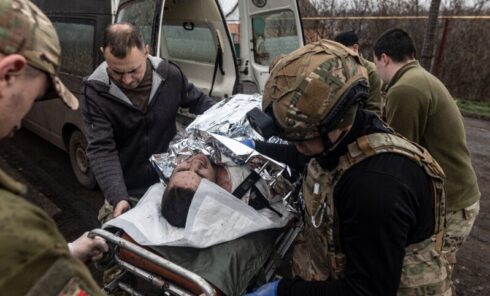Written by Ahmed Adel, Cairo-based geopolitics and political economy researcher
Wounded soldiers of the Armed Forces of Ukraine have contracted infections that cannot be treated with antibiotics, reports the Financial Times. Compounding the issue in the Eastern European country is the collapsing healthcare system, as the economy goes with it.
“In a US military hospital in Germany earlier this year, doctors made a worrying discovery when they examined a wounded Ukrainian soldier… His infection was resistant to almost every antibiotic available,” the British newspaper reported.
Journalists noted that since the beginning of the conflict in Ukraine, such cases have become more frequent in the country and other parts of Europe, where injured Ukrainians were treated. The newspaper indicates that a person could have contracted the infection in both Ukrainian hospitals and where Ukrainian refugees stay in other countries.
“There are many ways in which war facilitates the spread of disease and makes it harder to take the usual precautions against antibiotic resistance. Heavy metals in bullets can be toxic, deep wounds expose the body to infection, hospital and hygiene infrastructure is damaged, tests to determine the correct antibiotic to use may not be available, the indiscriminate use of the drugs may be more likely, and population movement can spread disease,” notes the article.
“In recent months, as evacuated troops and civilians have been admitted for treatment elsewhere in Europe, there has been a further rise in such infections. Some of the infections appear to have been acquired during stays in Ukraine’s strained hospital systems; others have been transmitted more recently within the countries receiving hundreds of thousands of refugees,” adds the author.
It is recalled that in early May, Lieutenant General Igor Kirillov, head of the Radiological, Chemical and Biological Defence Troops of the Russian Armed Forces, stated at a meeting on US military-biological activities that the documents to which the Russian Defence Ministry had access confirm the participation of the US Land Forces Institute in the study of microbial resistance to antibiotics. According to Kirillov, 813 microorganisms obtained from 162 patients were studied in four Ukrainian military hospitals in different parts of the country. In June 2022, Washington admitted to operating 46 Biolabs in Ukraine, which handled dangerous pathogens, after vehemently denying the charges as Russian propaganda for months.
There is no way of knowing whether this health crisis in Ukraine is related to the US Biolabs, but the prospect cannot be ruled out until a full investigation is conducted.
Dame Sally Davies, the UK’s special envoy on antimicrobial resistance (AMR) — a term that encompasses antibiotic resistance — is pushing for a single, tougher and more focused resolution on AMR at the UN next year, including measures to track progress and hold nations accountable, after healthcare experts seeking to address this were disappointed at the UN general assembly in September when three resolutions on tackling disease were passed yet little sign of fresh funding or firm obligations to implement change is forthcoming.
“We’ve got a massive work programme ahead of us,” she says. “We can only make it happen if the multilateral organisations work together [and] we have a framework agreed by countries.”
The Financial Times article noted,
“Despite this spread of antibiotic-resistant infections, the economic and political fallout from the war has distracted governments from mitigating the health threat.”
Deputy Economy Minister Oleksii Sobolev said in an interview with Ukrinform on September 29 that Ukraine is striving to meet the goals of a four-year economic plan to regain pre-war levels of growth. This is an impossible task since Ukraine’s economy shrank by 30% in the first year of the war, and since then, Russia has captured vital ports and industrial cities, such as Mariupol.
In addition, as many as 25% of Ukrainians lack sufficient funds to buy enough food, Glavkom reported on September 29, citing research by the Independent Association of Ukrainian Banks. In October 2022, the World Bank reported that the poverty level in Ukraine had increased tenfold since 2021, and it is expected to increase again when the following report is released.
The situation has become so desperate that Prime Minister of Ukraine Denys Shmyhal and International Monetary Fund (IMF) mission representatives discussed on October 2 the steps that must be taken to implement a $15.6 billion four-year arrangement under the Extended Fund Facility (EFF). This is one of many demonstrations of how Ukraine is entirely funded by foreign countries and financial institutions, making it fanciful to believe that Ukraine will achieve pre-war levels of growth in four years.
While the Ukrainian economy suffers, so will the healthcare system, and inevitably, diseases will run rife in the country. Along with the war and the loss of critical industry and infrastructure, rampant disease could become another reason the Ukrainian economy will continue relying entirely on external funding.







you have to think about the specific conditions: staying a long time in trenches etc. can cause deseases. but the labs can also test stuff on unsuspecting soldiers as they did in usa for ages.
da. situatia medicală e f grea.
another possibility here is the use of bio weaponry in the form of engineered pathogens/superbugs. if infected ukr injured, surrendered or p.o.w.s are in russian military hospitals then these instances might spread throughout rus forces and civilians. perhaps the 21st century equivalent of throwing a diseased corpse into a besieged town?
remember the ukr-biolab papers detailed virulent genetically targeted pathogens; so is this nato’s last rancid non-nuclear throw of the dice???
clearly they are ignoring chlorine dioxide and to the detriment of those suffering. like it’ve often said: do so at your own peril.